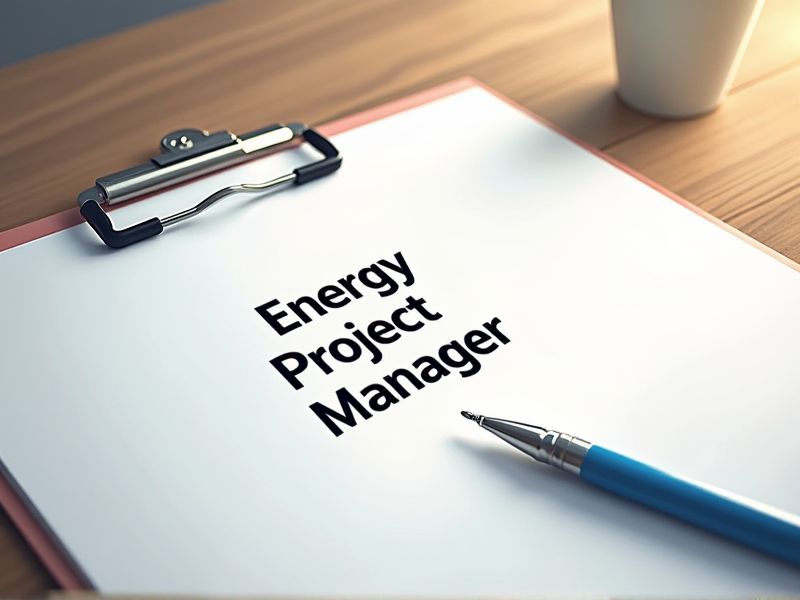
The role of an Energy Project Manager demands in-depth knowledge of energy systems, regulatory standards, and project management methodologies. Obtaining specific certifications enhances credibility and assures employers of the manager's proficiency in overseeing complex energy projects. Certifications also equip managers with the skills necessary to navigate ever-evolving technological advancements and environmental regulations. Here are some key certifications beneficial for an Energy Project Manager.
Project Management Professional (PMP)
Project Management Professional (PMP) certification equips an energy project manager with standardized methodologies essential for overseeing complex energy projects efficiently. It enhances credibility and stakeholder confidence, critical factors in managing multifaceted tasks within the energy sector. PMP certification fosters skills in risk management, crucial for anticipating and mitigating potential setbacks in energy projects. Training under PMP ensures that project managers are proficient in resource optimization, vital for maximizing the return on investment in energy initiatives.
Certified Energy Manager (CEM)
The role of a Certified Energy Manager (CEM) is essential for an Energy Project Manager because it ensures the implementation of efficient energy management strategies. A CEM can expertly analyze energy usage data and pinpoint areas for cost reduction, leading to more sustainable and cost-effective operations. By possessing deep knowledge of energy systems, a CEM can help navigate regulatory compliance and secure relevant incentives, optimizing project outcomes. Their specialized expertise also enhances project credibility, fostering stakeholder confidence and investment.
LEED Accredited Professional (LEED AP)
An Energy Project Manager with a LEED Accredited Professional (LEED AP) credential signals competence in sustainable practices, enhancing project credibility. Employers recognize that a LEED AP can navigate complex green building certifications, ensuring compliance and maximizing energy efficiency. This expertise aids in reducing operational costs by integrating sustainable design principles. The credential also signifies a commitment to environmental stewardship, appealing to clients focused on sustainability goals.
Energy Risk Professional (ERP)
An Energy Risk Professional (ERP) provides crucial insight into market volatility, which helps an Energy Project Manager make informed decisions on resource allocation. Understanding regulatory changes is vital, and an ERP is adept at navigating these complexities to keep projects compliant and on track. Risk assessment skills from an ERP enable the identification and mitigation of financial and operational risks, safeguarding the project's success. An ERP's proficiency in evaluating geopolitical effects on energy markets enhances an Energy Project Manager's strategic planning capabilities.
Certified Renewable Energy Professional (REP)
A Certified Renewable Energy Professional (REP) provides specialized expertise crucial for managing renewable energy projects effectively, ensuring that projects align with sustainable practices and industry standards. Their certification signifies a deep understanding of energy efficiency, which can lead to optimized resource management and cost savings. They bring credibility and assure stakeholders of the project's commitment to renewable energy goals. As technology and energy policies evolve, having a REP ensures the project stays ahead of regulatory compliance and technological advancements.
Certified Energy Auditor (CEA)
A Certified Energy Auditor is crucial for an Energy Project Manager because they provide accurate energy assessments that identify potential inefficiencies. Their expertise enables the development of data-driven strategies to reduce energy consumption and costs. They ensure compliance with industry regulations, mitigating legal and financial risks. Their insights enhance the sustainability and effectiveness of energy projects, boosting overall project success.
PMI Agile Certified Practitioner (PMI-ACP)
Energy projects often involve complex and dynamic processes requiring adaptive methodologies. PMI-ACP certification equips managers with agile principles and practices capable of handling such uncertainties. Agile techniques enhance a project's responsiveness to change, ensuring better management of resources and timelines. Possessing PMI-ACP can, therefore, lead to improved project outcomes and stakeholder satisfaction in the energy sector.
Six Sigma Green Belt (SSGB)
Six Sigma Green Belt (SSGB) expertise equips an Energy Project Manager with strong analytical skills to identify inefficiencies and process improvement areas. Mastery in SSGB methodologies allows for data-driven decision-making, enhancing project outcomes and cost-effectiveness in energy projects. SSGB knowledge fosters a culture of quality and continuous improvement, essential in the energy sector for achieving sustainability goals. An Energy Project Manager with SSGB certification can effectively lead cross-functional teams, ensuring that project timelines and quality standards are consistently maintained.
Certified Sustainability Professional (CSP)
The increasing global demand for sustainable energy projects drives the necessity for an Energy Project Manager with a Certified Sustainability Professional (CSP) credential, ensuring adherence to environmental standards and regulations. With a CSP certification, the manager gains expertise in integrating sustainable practices, reducing environmental impact, and enhancing project efficiency. Stakeholders invest in projects with certified professionals, anticipating better risk management and long-term resource conservation. CSPs facilitate the seamless incorporation of innovative sustainability solutions, fostering industry advancements and competitive advantage.
Certified Construction Manager (CCM)
The Certified Construction Manager (CCM) credential enhances an Energy Project Manager's credibility, which can lead to increased trust from stakeholders. This credential indicates proficiency in managing complex timelines and budgets, crucial for energy projects that frequently encounter dynamic market conditions. Holding a CCM demonstrates a commitment to adhering to rigorous industry standards, which can improve project outcomes. Employers often recognize the CCM as a mark of quality, potentially offering more career opportunities and higher compensation for energy project managers.
Summary
By obtaining certifications, you can enhance credibility and demonstrate expertise in the energy sector. This often leads to increased job opportunities and potential for career advancement. Certified Energy Project Managers tend to drive more efficient project outcomes due to their specialized knowledge. Hiring managers may perceive you as a valuable asset, improving your competitive edge in the job market.
